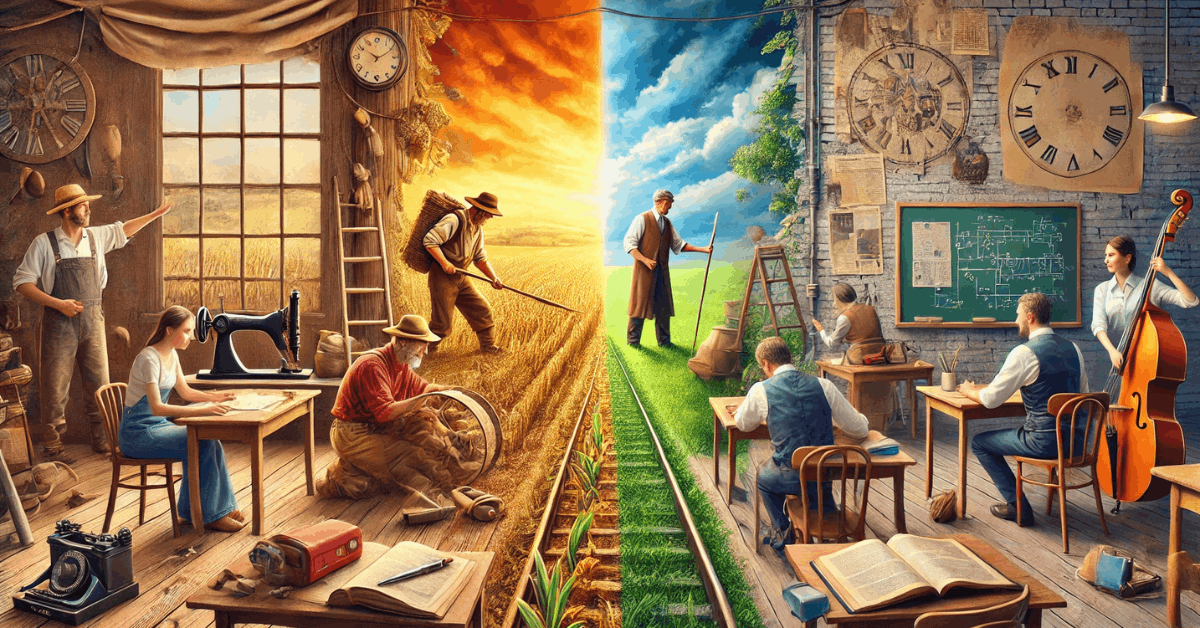Some careers endure, no matter how much the world changes. This article highlights jobs that have survived through history, proving their lasting value.
You’ll see how these roles were adapted, useful, and respected. The goal is simple: to help you understand why these jobs never faded.
Still Useful After Centuries
Some roles stay relevant no matter the era. These are careers that people needed in ancient times and still rely on today. They’ve adapted to tools, tech, and shifting lifestyles.
A farmer now uses satellite-guided tractors, while a teacher might run online classes through Khan Academy.
A scribe became today’s content creator, working through platforms like Medium. These old roles changed form but kept their purpose clear— to serve real human needs.

Timeless Careers That Still Exist Today
Some roles never fade—they adjust, survive, and stay useful. These examples show how essential work can outlast generations and remain relevant even now.
Farmer
Farming began in early human settlements. It quickly became a base for trade and survival. Farmers have always been essential to food and local economies.
Over time, they adopted tools like irrigation systems and automated tractors. Platforms such as John Deere now provide smart farming solutions.
Urban farming has also made this role active in cities.
Teacher
Teaching existed in places like ancient Greece and Egypt. It helped shape values, math, language, and thinking.
Early methods were face-to-face and slow. Now, platforms like Coursera make learning global.
The role remains central to how people grow and succeed. No society can function without learning support.
Builder / Mason
Builders shaped old temples, roads, and fortresses. They learned through apprenticeships passed down for centuries.
Stone, wood, and early tools were the base materials. Now, many use digital blueprints and automated machines.
Today’s work mixes both tradition and modern tech. Groups like Autodesk support this with construction software.
Healer / Doctor
Healers used herbs, rituals, and trial-and-error treatments. They held status in early villages and cities. Over time, science created the modern healthcare system.
Medicine advanced with tools, research, and formal education. Sites like the Mayo Clinic continue that work today. The need for care never goes away.
Merchant / Trader
People started with barter, then coins and weights. Traders moved goods between regions and cultures. They opened trade routes and shaped global interaction.
Now, commerce lives online through platforms like Alibaba. The concept remains: offer value, move goods. Exchange is still vital to all economies.
Soldier / Warrior
Early warriors used swords, shields, and small formations. They defended land, tribes, and rulers. Warfare evolved with strategy, armor, and tech.
Today, military roles include cybersecurity, logistics, and drones. Organizations like NATO coordinate defense at a global level. The need for protection hasn’t changed.
Artist / Craftsperson
Cave art, pottery, and weaving marked early expression. These creators preserved myths, beliefs, and emotions. Their value stayed high through every culture.
Today’s creatives use software, AI, and digital canvases. Tools like Adobe support this evolution. But the heart of making something by hand remains the same.
Writer / Scribe
Ancient scribes recorded laws, events, and stories. They used stone, clay, and early ink. Their work shaped memory and history.
Now, writers publish on blogs, news sites, and digital platforms like Substack. The medium changed, but the need to document stays strong. Words still move ideas.
Cook / Baker
Food roles existed in every culture, from royal kitchens to home fires. Meals connected people and carried tradition. Cooking once relied only on instinct and fire.
Now, pros use recipe software and smart ovens. Sites like Serious Eats help home and pro cooks alike. Feeding others still holds value in every place.
What Do These Roles Have in Common?
Below, you’ll see what keeps them going. These traits explain their long-term relevance.
Survival Depends on Human Need
These roles stay alive because people always need food, shelter, care, and knowledge. Their purpose doesn’t change with time.
These needs exist in every society. That’s why these roles continue.
They Evolve with the World
Each role is adjusted with tools, trade, and tech. From handmade tools to machines, they stayed active. Culture and economy didn’t stop them. They changed form, not purpose.
They Offer Real Value
These roles focus on practical use and community support. They solve daily problems. They make life easier or safer. That gives them lasting value.
Passed Down by Experience
These skills came through apprenticeship, not lectures. You learn by doing, watching, and practicing. It’s direct, not academic. That makes the skill stronger.
They Don’t Require a Degree
Most of these roles start with hands-on learning, not school. Anyone can begin if they are willing to work. Growth comes from effort, not a diploma. That opens doors for many.
They Depend on Key Traits
These roles survive by being reliable, useful, and adaptable. They don’t rely on trends. They evolve with demand. That’s how they stay needed.
How Do These Roles Adapt to Modern Times?
Many long-standing roles still exist because they keep up with modern tools:

- Technology and software now support traditional work.
- AI, automation, and apps assist, but don’t fully replace human roles.
- Online platforms expand access and reach.
- Training tools like YouTube, Coursera, and Udemy make learning easier.
- Urban growth has reshaped how some roles function in cities.
- Core skills remain, even if the method looks different.
Tips to Stay Relevant Like These Roles
To stay useful long-term, focus on what makes these roles last:
- Learn skills that solve real problems in daily life.
- Don’t chase trends—stick to what people truly need.
- Combine old techniques with new tools and systems.
- Create or fix things people use, not just want.
- Stay steady, even if the industry changes.
- Keep improving—use feedback and platforms like LinkedIn Learning.
Why These Roles Still Matter Today?
These long-standing paths are still needed for good reason:
- They give stability even when economies shift.
- They help preserve culture and human connection.
- They hold up systems that provide safety, food, and health.
- They give purpose, not just a paycheck.
- They remind us that humans are still needed, even with tech.
- People respect useful, skill-based work.
The Bottom Line: What Keeps These Roles Alive?
Some roles never fade because they meet basic human needs. They last by staying useful, not trendy.
From hands-on learning to real-world value, they prove their worth in every era. These are the jobs that have survived through history—and they still matter now.











